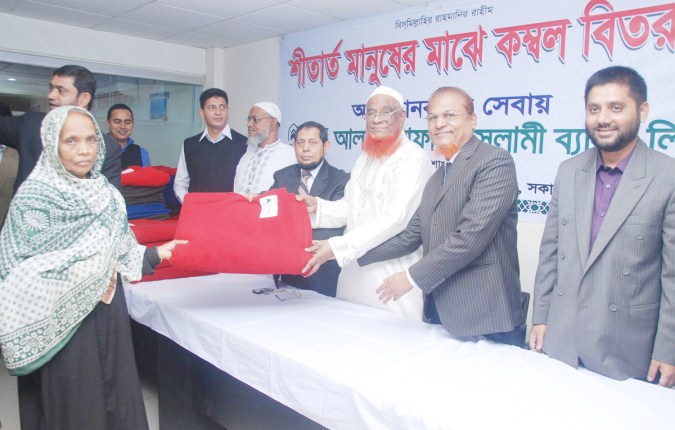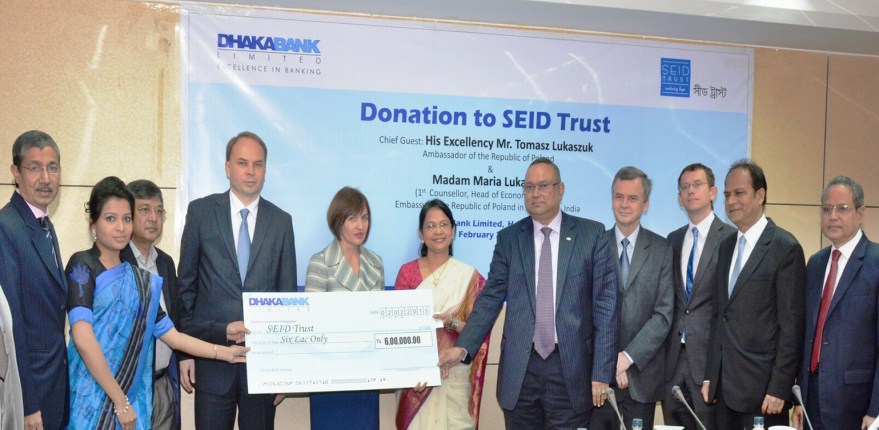Banking
Fazlul promoted to DMD of Al-Arafah Islami Bank
 Md Fazlul Karim has been promoted to deputy managing director of Al-Arafah Islami Bank Limited. Prior to his new assignment, Fazlul Karim served as the executive vice president of the bank, said a press release. Fazlul Karim started his career in 1983 as a probationary officer in Bangladesh Krishi Bank. In 1984, he joined Agrani Bank as assistant engineer (Senior Office). He worked in international division, personnel division and other important divisions and zonal offices of Agrani Bank. Moreover, he worked as manager of Laldighirpar Branch of Sylhet, Agrabad Jahan Bhabhan branch of Chittagong, Amin Court and Ramna branch of Dhaka. He joined Al-Arafah Bank in 2009 as a senior vice president. He also served as manager of Motijheel Corporate Branch and Motijheel Branch (Main Branch). Fazlul Karim received several awards for his outstanding performance in both of the banks. He received BSc. Agricultural Engineering (Hons) degree from Bangladesh Agricultural University, Mymensingh and an MBA in Banking and Finance from International Islamic University, Chittagong.
Md Fazlul Karim has been promoted to deputy managing director of Al-Arafah Islami Bank Limited. Prior to his new assignment, Fazlul Karim served as the executive vice president of the bank, said a press release. Fazlul Karim started his career in 1983 as a probationary officer in Bangladesh Krishi Bank. In 1984, he joined Agrani Bank as assistant engineer (Senior Office). He worked in international division, personnel division and other important divisions and zonal offices of Agrani Bank. Moreover, he worked as manager of Laldighirpar Branch of Sylhet, Agrabad Jahan Bhabhan branch of Chittagong, Amin Court and Ramna branch of Dhaka. He joined Al-Arafah Bank in 2009 as a senior vice president. He also served as manager of Motijheel Corporate Branch and Motijheel Branch (Main Branch). Fazlul Karim received several awards for his outstanding performance in both of the banks. He received BSc. Agricultural Engineering (Hons) degree from Bangladesh Agricultural University, Mymensingh and an MBA in Banking and Finance from International Islamic University, Chittagong.
Turmoil upsets forex market BB mops up $330m from banking system
The drawn-out political turmoil has started to bear down on the foreign exchange market, compelling the central bank to buck its dollar-selling spree and start purchasing instead to keep the exchange rate stable.
So far this year, Bangladesh Bank has purchased $330 million from the open market, in contrast to the $357 million sold in the last two months of 2014 in the face of high demand for foreign currency.
Subsequently, the average dollar-taka exchange rate has remained stable at Tk 77.8 since January 27.
“Just as the investment demand was picking up towards the end of last year, the re-emergence of political turmoil from the beginning of the new year has totally spoiled the appetite,” said the treasury head of a private bank preferring not to be named.
The rising demand for dollars in the last two months of 2014 can be attributed to the return for investment appetite then, he added.
Since the turn of the year, which coincided with the political upheaval, the number of letters of credit opened for capital machinery and raw materials has dropped sharply, said another treasury head.
Not only that, the number of LCs opened for importing other goods too has slumped. The countrywide blockades and hartals, ongoing since January 6, have been hampering transportation, spiralling ferrying costs and consequently increasing the overall cost for imports, he said.
Subsequently, the demand for imported goods has dropped.
January's non-food inflation figures also support this view. Non-food inflation dropped to 6.01 percent last month, after rising for three consecutive months.
Kazi Saidur Rahman, a general manager of the BB, differed with the bank officials' views, saying it was just a seasonal effect.
Typically, at the beginning of the year, the demand for imports is low, he said. “If it is because of the political turmoil, we will know two to three months from now and not at this moment.”
The central bank in its Monetary Policy Statement reassured that it would intervene in the forex market to keep the exchange rate stable and quell inflationary pressure.
News:The Daily Star/5-Feb-2015
Banks in India feel squeeze of rock-bottom fees
Foreign investment banks are showing signs they will be more choosy about bidding for roles to help manage government share sales after the country's largest ever equity offering of $3.6 billion left them splitting a fee of just one rupee.
Measly fees for advisory roles in government share sales are not unusual in India, but bankers say they are struggling now to justify the costs to shareholders in the current environment of low interest rates and rising regulatory costs.
Banks say state share sales - a key plank of New Delhi's efforts to trim its fiscal deficit – tie-up staff for months on end, leaving teams stretched and the advisers out of pocket.
The low fees are also eroding their pricing power in private sector deals, they say.
"The bitter reality is the government deals are the biggest deals in India. If you are not making money on them, how can you justify a rise in cost in India and hire more bankers?" said the investing banking head of a large European bank in Mumbai.
The banker, who declined to be named, said that in the absence of being able to hire more staff, banks would pick and chose large government share sales to "get you some league table credit".
"We are doing just that," he said, reflecting a view shared by other bankers.
Late last week, seven banks, including four foreign ones, managed the Indian government's sale of a 10 percent stake in Coal India Ltd.
New Delhi is also looking to hire banks to sell minority stakes in five other companies, which could raise a combined $3 billion based on current market values, as soon as this week. The government needs to raise $10 billion by the end of March to reach its fiscal deficit target.
However, in the latest deal, no foreign banks submitted bids to manage the sale of a government stake worth about $900 million in state miner NMDC Ltd. The tender closed on Tuesday with four Indian banks bidding, compared to five sought, a government website showed. When the government sold a similar stake in NMDC in 2012, more than a dozen banks had bid for the business.
Advisory fees on government share sales are not particularly lucrative globally, but India is probably the toughest market, said Tarun Kataria, chairman of advisory firm Cityspring Management in Singapore.
"India is perhaps the only market globally where (government) deals are done for zero fees," Kataria said.
"It's massively sub-optimal for the issuer since the bankers are not sufficiently incentivised to get the best possible price execution from global investors," said Kataria, who was HSBC's India head of global banking and markets until 2010. "In addition, it reduces the banks' bargaining power in private-sector deals."
Aradhana Johri, secretary in the government's Department of Divestment, did not respond to Reuters request for comment.
Privately owned HDFC Bank hired nine banks, including Bank of America Merrill Lynch, JPMorgan and Credit Suisse, for its $1.6 billion share sale launched on Wednesday.
The fee, say people with direct knowledge of the situation, will be 1.2 percent of the total amount raised, which compares with at least 2 percent typically seen a year ago.
All in all, foreign banks are now reluctant to bid enthusiastically for government sales.
"One would have taken pride in doing this a couple of years ago because of the league table credit you get, but today people are under huge pressure to show income," said the equity market head of a foreign bank, who worked on the Coal India offering.
News:The Daily Star/6-Feb-2015
AAIBL initiates Blanket Distribution Program for the poor

DHAKA: Al-Arafah Islami Bank Limited is distributing blankets among the cold effected people throughout the country. Director of the Bank Alhajj Abdul Malek Mollah inaugurated the Blanket Distribution Program organized by AIBL Khilkhet branch, recently. Deputy Managing Director Md. Mofazzal Hossain and Head of AIBL Dhaka North Zone Manir Ahmad were present in the occasion. Manager of Khilkhet Branch Md. Habibullah organized the distribution program.
As a part of Corporate Social Responsibility (CSR), the Bank is providing more than 16 thousand blankets to the poor of 23 districts of the country. Selected branches of the Bank are carrying on the program.
Arafah Islami Bank Limited is scheduled commercial bank registered by the Bangladesh
Bank. The functions of the bank cover a wide range of banking and functional activities to individuals, firms, corporate bodies and other multinational agencies.
The main objective of the study is to give an overview of AIBL and identify the strength, weakness and critical risk factor of this bank.
Data collected for the study in two different modes namely primary and secondary. Face
To face conversation with the respective officer of the branch was the main mode to collect primary data and for secondary dat
a various publications and related body are observed. The main limitation of the study was short time limit and authenticated data insufficiency. Officer of the bank are capable. Even though many of them simply know the working procedure of what they are doing but don’t know the philosophy behind doing those.
The synergy of dedicated manpower, technology, and market opportunity can lead the organization to achieve the goal; a bank must establish and hold fast to adequate policies, practices and procedures for evaluating the quality of asset and the adequacy of loan provision.
Dhaka Bank donates to SEID Trust
 Dhaka : Dhaka Bank Limited recently donated a cheque of Tk.6 Lac to SEID Trust as a part of CSR activity of the Bank, reports in press release. SEID Trust is a school for physical and mental development of the special children. The Chief Guest of the cheque handover program Tomasz Lukaszuk, Ambassador of the Republic of Poland in Bangladesh. The cheque was formally handed over to the Managing Trustee of SEID Trust Dilara Sattar Nitu, Tomasz Lukaszuk and Director & Former Chairman of Dhaka Bank Limited Rrshadur Rahman. Among others, Madam Maria Lukaszuk, (1st Counsellor, Head of Economic Section), Embassy of the Republic of Poland in India, delegates from Republic of Poland, Dhaka Bank’s Former Chairman A.T.M Hayatuzzaman Khan, Managing Director Niaz Habib, Deputy Managing Director Mr. Emranul Huq and other high officials were present. At Dhaka Bank, we draw our inspiration from the distant stars. Our vision is to assure a standard that makes every banking transaction a pleasurable experience. Our endeavor is to offer you supreme service through accuracy, reliability, timely delivery, cutting edge technology and tailored solution for business needs, global reach in trade and commerce and high yield on your investments. Our people, products and processes are aligned to meet the demand of our discerning customers. Our goal is to achieve a distinct foresight. Our prime objective is to deliver a quality that demonstrates a true reflection of our vision- Excellence in Banking. The Mission of Dhaka Bank is to be the premier financial institution in the country providing high quality products and services backed by latest technology and a team of highly motivated personnel to deliver Excellence in Banking.
Dhaka : Dhaka Bank Limited recently donated a cheque of Tk.6 Lac to SEID Trust as a part of CSR activity of the Bank, reports in press release. SEID Trust is a school for physical and mental development of the special children. The Chief Guest of the cheque handover program Tomasz Lukaszuk, Ambassador of the Republic of Poland in Bangladesh. The cheque was formally handed over to the Managing Trustee of SEID Trust Dilara Sattar Nitu, Tomasz Lukaszuk and Director & Former Chairman of Dhaka Bank Limited Rrshadur Rahman. Among others, Madam Maria Lukaszuk, (1st Counsellor, Head of Economic Section), Embassy of the Republic of Poland in India, delegates from Republic of Poland, Dhaka Bank’s Former Chairman A.T.M Hayatuzzaman Khan, Managing Director Niaz Habib, Deputy Managing Director Mr. Emranul Huq and other high officials were present. At Dhaka Bank, we draw our inspiration from the distant stars. Our vision is to assure a standard that makes every banking transaction a pleasurable experience. Our endeavor is to offer you supreme service through accuracy, reliability, timely delivery, cutting edge technology and tailored solution for business needs, global reach in trade and commerce and high yield on your investments. Our people, products and processes are aligned to meet the demand of our discerning customers. Our goal is to achieve a distinct foresight. Our prime objective is to deliver a quality that demonstrates a true reflection of our vision- Excellence in Banking. The Mission of Dhaka Bank is to be the premier financial institution in the country providing high quality products and services backed by latest technology and a team of highly motivated personnel to deliver Excellence in Banking.



